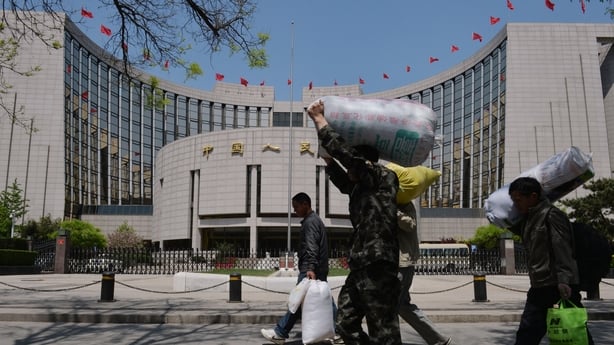China has revised its annual economic growth rate in 2014 to 7.3% from the previously released figure of 7.4%, the National Bureau of Statistics said today.
Gross domestic product stood at 63.6 trillion yuan ($10 trillion) last year, down by 32.4 billion yuan from the initial estimate, the bureau said in a statement.
The bureau has revised down 2014 growth of the services sector by 0.3 percentage points to 7.8%, which helped drag down estimated GDP growth rate, it said.
The primary sector - the country's agriculture sector - grew 4.1% last year, while growth of the secondary sector, which includes manufacturing and construction, rose 7.3%.
After the revision, the services sector accounted for 48.1% of GDP last year, down from the previously announced 48.2%, the bureau said.
The manufacturing and construction sector accounted for 42.7% of GDP while the farm sector accounted for 9.2%.
The world's second-largest economy grew 7% in the first half from a year earlier - in line with the government's target for 2015.
But recent downbeat data has raised the risk the government could miss the full-year growth target.
Meanwhile, China's policymakers and regulators tried to soothe the country's jittery markets today.
It has promised deeper financial market reforms and stressed the economy was showing signs of stabilising, as stocks resumed trading after a four-day long weekend.
Looking to draw a line under wild gyrations in Chinese equity markets, which have fallen 40% since the middle of June, China's securities regulator said it would take more steps to ensure stable markets, while government officials said the worst of the volatility was over.
"The government won't normally intervene, but when there are severe, abnormal fluctuations in the markets, the government can't just sit on the sidelines and must take decisive and timely measures," the China Securities Regulatory Commission said last night.
It added it would consider launching a circuit breaker system for the country's stock indexes, to halt trading if there are particularly wild price moves.
After an initial bounce, the comments had a fairly muted impact on stocks, which were trading for the first time since last Wednesday.
Chinese policymakers are determined to show their financial markets are back to normal, after the wild swings in stocks combined with last month's surprise devaluation in the yuan, or renminbi, caused jitters in markets around the world.
China's Central Bank Governor Zhou Xiochuan told financial leaders from the world's 20 biggest economies over the weekend that Chinese equity markets had almost completed their correction after a steep run up in the first half of the year.

"Currently, the renminbi to dollar exchange rate already tends toward stability, the stock market adjustment is already roughly in place and financial markets can be expected to be more stable," Zhou told G20 finance ministers in Turkey, according to a statement from the People's Bank of China, the central bank.
Finance Minister Lou Jiwei was quoted in the same statement saying central government spending would rise 10% this year, up from the 7% growth budgeted at the start of 2015.
A string of soft economic data has made it harder for Chinese regulators to bring stability back to their markets, as fears grow of a hard landing for the world's second-biggest economy.
The economy is headed for its slowest expansion in 25 years, and concerns have been building that it may miss the official growth forecast of around 7%.
However, analysts say increased government spending, combined with five interest rate cuts since last November, mean that risk has diminished.

